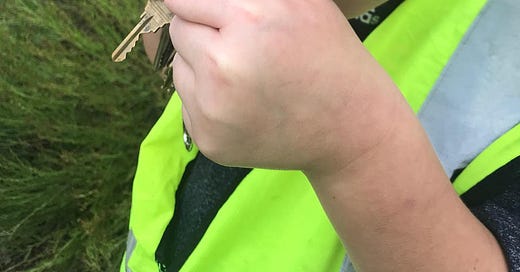This time of year can be pretty dull or exciting. It's according to how we look at things. For instance, even though most of my plants are dead, they still contain seeds for the birds to munch on. Plus, the dried stems and seedheads add a unique charm to my garden, especially when covered with frost. And the ice sculptures that decorate the surface of water puddles are absolutely lovely.
I must admit, the cold temperatures dissuade me from spending much time in the great outdoors. However, a brisk walk energizes my little gray cells as I observe nature's beauty surrounding me. Plus, my winter sowing keeps me active too.
That takes care of daytime activities, but really nasty days and the extraordinarily long nights are a different story.
I don't like vegetating in front of the TV. I love to read and spend many hours trying to solve a mystery before the protagonist figures it out. However, sometimes I'd rather do something productive, preferably something worthwhile that would benefit humanity and the environment.
I'm sure we all share that same wish, and I found something that fulfills my dream – Citizen Science.
As a citizen scientist, I participate in projects that make a difference. SciStarter and iNaturalist list hundreds, if not thousands, of citizen science projects ranging from archaeology and astronomy to insects and pollinators to physics and social sciences.
While working on citizen science projects, ordinary people contribute to the scientific research of environmental and social issues by collecting and analyzing data, interpreting results, making discoveries, and developing technologies and applications.
The term citizen science only dates back to the 1990s. Still, residents' role in recording scientific data can be traced to ancient times, when the early Egyptians kept careful records of nearly everything, including the annual flooding of the Nile River and the resulting variations in harvests. Likewise, Chinese farmers have been tracking destructive migratory locusts for the past 2000 years and will continue as long as necessary.
So, the concept isn't new, but the scale and worldwide impact of scientific research has reached phenomenal proportions. Having a diverse group of participants conducting research in differing regions and conditions makes the results more representative of the whole picture. Plus, having many people working on the project concurrently shortens the time needed to complete the study. And it's not only the scientific community that benefits from the collaboration. Data suggests that participating in scientific research helps improve literacy and understanding in both adults and children. It helps develop critical thinking skills that can be applied to daily activities and broadens interests in new subjects that people would have never considered investigating before.
The best part is that it's a fantastic way to spend time with your family, doing something you all enjoy while learning something new.
I've enjoyed analyzing blood vessels in mouse brains affected with Alzheimer's for stalls (clogs) on Stall Catchers. Watching the videos and determining whether the blood vessels are flowing or stalled is challenging. Earning points and competing with others makes it seem like a computer game, but it is so much more! This project has advanced Alzheimer's research tremendously beyond the project creators' expectations.
I'm involved with citizen science projects year-round, such as Natural North Carolina, iNaturalist, and ISeeChange, as well as others that record my personal observations of bumblebees, fireflies, squirrels, and pollinator plants. This winter, I will try some projects in different categories, such as astronomy, weather, and archaeology.
Go ahead and try it out for yourself. You'll never be bored again; best of all, we can make a difference.
Dear Reader,
I'd be ever so grateful if you would take a few minutes to recommend Let's Get Our Hands Dirty to your followers on Substack and other social media platforms.
Thank you!
Greta
Let's Get Our Hands Dirty is a reader-supported publication. This post is free as are all my posts. Please subscribe so you can receive notification when new articles are published. I'd love for you to become a part of our nature-loving family. Basic subscriptions are free, but if you sign up for a paid subscription as a love offering, that would be wonderful and greatly appreciated!
Have a fabulous day,
Greta
Please use the buttons below to Like, Comment, Restack, and Share my post on Substack and other social media platforms.
THANK YOU SO MUCH!






